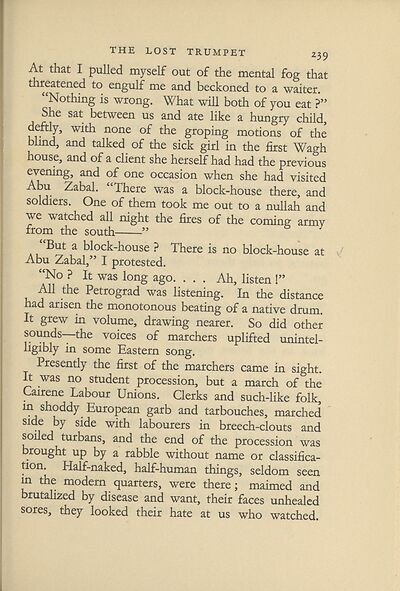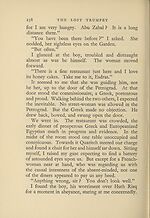Lost trumpet
(239)
Download files
Complete book:
Individual page:
Thumbnail gallery: Grid view | List view

THE LOST TRUMPET
239
At that I pulled myself out of the mental fog that
threatened to engulf me and beckoned to a waiter.
“Nothing is wrong. What will both of you eat ?”
She sat between us and ate like a hungry child,
deftly, with none of the groping motions of the
blind, and talked of the sick girl in the first Wagh
house, and of a client she herself had had the previous
evening, and of one occasion when she had visited
Abu Zabal. “There was a block-house there, and
soldiers. One of them took me out to a nullah and
we watched all night the fires of the coming army
from the south ”
“But a block-house ? There is no block-house at J
Abu Zabal,” I protested.
“No ? It was long ago. ... Ah, listen !”
All the Petrograd was listening. In the distance
had arisen the monotonous beating of a native drum.
It grew in volume, drawing nearer. So did other
sounds—the voices of marchers uplifted unintel-
hgibly in some Eastern song.
Presently the first of the marchers came in sight.
It was no student procession, but a march of the
Cairene Labour Unions. Clerks and such-like folk,
in shoddy European garb and tarbouches, marched
side by side with labourers in breech-clouts and
soiled turbans, and the end of the procession was
brought up by a rabble without name or classifica¬
tion. Half-naked, half-human things, seldom seen
in the modern quarters, were there; maimed and
brutalized by disease and want, their faces unhealed
sores, they looked their hate at us who watched.
239
At that I pulled myself out of the mental fog that
threatened to engulf me and beckoned to a waiter.
“Nothing is wrong. What will both of you eat ?”
She sat between us and ate like a hungry child,
deftly, with none of the groping motions of the
blind, and talked of the sick girl in the first Wagh
house, and of a client she herself had had the previous
evening, and of one occasion when she had visited
Abu Zabal. “There was a block-house there, and
soldiers. One of them took me out to a nullah and
we watched all night the fires of the coming army
from the south ”
“But a block-house ? There is no block-house at J
Abu Zabal,” I protested.
“No ? It was long ago. ... Ah, listen !”
All the Petrograd was listening. In the distance
had arisen the monotonous beating of a native drum.
It grew in volume, drawing nearer. So did other
sounds—the voices of marchers uplifted unintel-
hgibly in some Eastern song.
Presently the first of the marchers came in sight.
It was no student procession, but a march of the
Cairene Labour Unions. Clerks and such-like folk,
in shoddy European garb and tarbouches, marched
side by side with labourers in breech-clouts and
soiled turbans, and the end of the procession was
brought up by a rabble without name or classifica¬
tion. Half-naked, half-human things, seldom seen
in the modern quarters, were there; maimed and
brutalized by disease and want, their faces unhealed
sores, they looked their hate at us who watched.
Set display mode to:
![]() Universal Viewer |
Universal Viewer | ![]() Mirador |
Large image | Transcription
Mirador |
Large image | Transcription
Images and transcriptions on this page, including medium image downloads, may be used under the Creative Commons Attribution 4.0 International Licence unless otherwise stated. ![]()
| The books of Lewis Grassic Gibbon > Lost trumpet > (239) |
|---|
| Permanent URL | https://digital.nls.uk/205192584 |
|---|
| Description | J. Leslie Mitchell. |
|---|---|
| Shelfmark | Vts.143.j.8 |
| Attribution and copyright: |
|
| Description | Sixteen books written by Lewis Grassic Gibbon (1901-1935), regarded as the most important Scottish prose writer of the early 20th century. All were published in the last seven years of his life, mostly under his real name, James Leslie Mitchell. They include two works of science fiction, non-fiction works on exploration, short stories set in Egypt, a novel about Spartacus, and the classic 'Scots Quair' trilogy which includes 'Sunset Song'. Mitchell's first book 'Hanno, or the future of exploration' (1928) is rare and has never been republished. |
|---|---|
| Additional NLS resources: |
|

